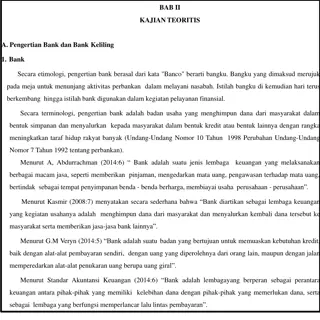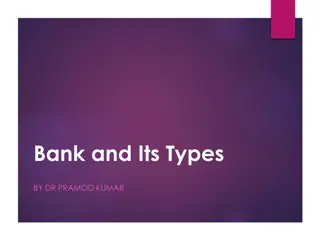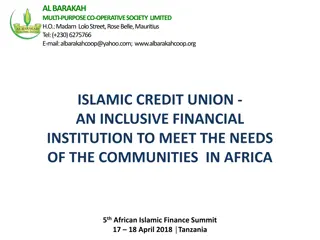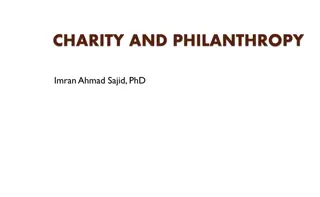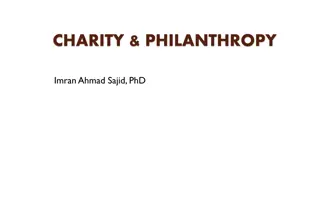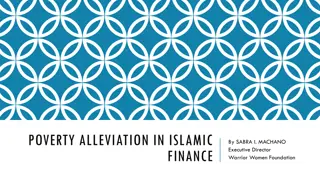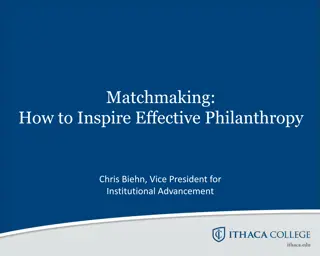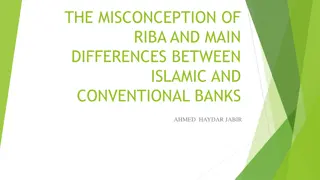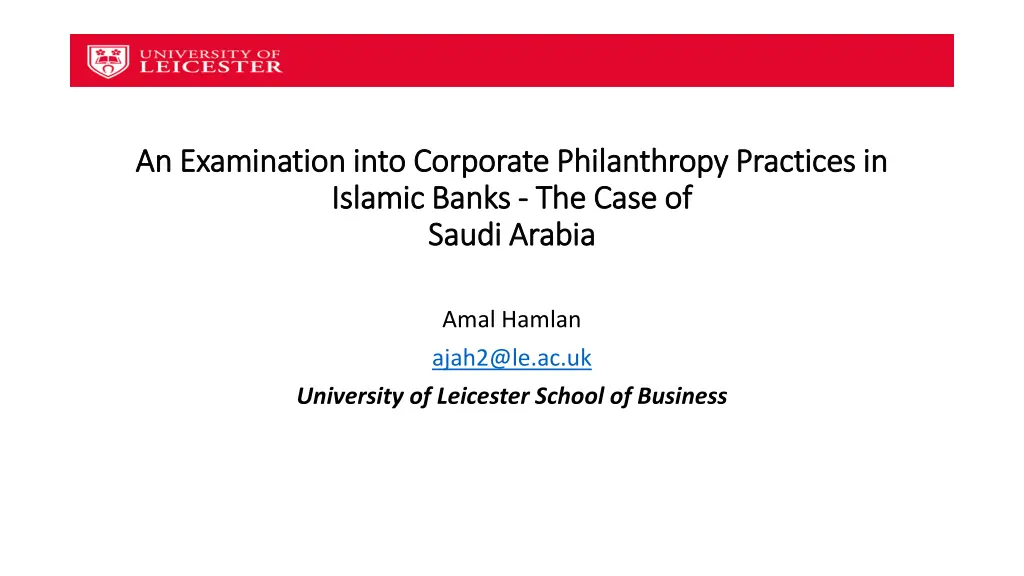
Examining Corporate Philanthropy Practices in Islamic Banks of Saudi Arabia
Explore the unique landscape of corporate philanthropy in Islamic banks in Saudi Arabia, diving into the intersection of Islamic values, culture, and business practices. Learn about the obligatory and voluntary aspects of corporate philanthropy within the context of Islamic law and principles. Delve into the importance of philanthropy in Islam and its impact on society.
Download Presentation

Please find below an Image/Link to download the presentation.
The content on the website is provided AS IS for your information and personal use only. It may not be sold, licensed, or shared on other websites without obtaining consent from the author. If you encounter any issues during the download, it is possible that the publisher has removed the file from their server.
You are allowed to download the files provided on this website for personal or commercial use, subject to the condition that they are used lawfully. All files are the property of their respective owners.
The content on the website is provided AS IS for your information and personal use only. It may not be sold, licensed, or shared on other websites without obtaining consent from the author.
E N D
Presentation Transcript
An Examination into Corporate Philanthropy Practices in An Examination into Corporate Philanthropy Practices in Islamic Banks Islamic Banks - - The Case of Saudi Arabia Saudi Arabia The Case of Amal Hamlan ajah2@le.ac.uk University of Leicester School of Business
Agenda Agenda Introduction Corporate Philanthropy CP Philanthropy in Islam Research Questions Research Methodology Data Analysis Findings Conclusions 01/07/2025 Amal Hamlan (ajah2@le.ac.uk) 2
Why do businesses exist? Why do businesses exist? society profits There is only one social responsibility of businesses, which is to maximize their profit within the rules of the game (Friedman, 1970). (Business of Business is Business)
Corporate Philanthropy (CP) Corporate Philanthropy (CP) Corporate philanthropy is, in simple terms, the act of corporations donating a part of their profit or resources to a non-profit cause or organization (Wymer and Samu, 2003). It includes both cash and noncash contributions such as products and employee volunteerism. 01/07/2025 Amal Hamlan (ajah2@le.ac.uk) 4
Corporate Philanthropy (CP) Corporate Philanthropy (CP) ? discretionary obligatory
Discretionary Responsibility Carroll ( Carroll (1979 pyramid pyramid 1979) )
Saudi Arabia Saudi Arabia Islamic law Islamic culture Islamic value Banks in Islamic countries such as Saudi Arabia have a combination of Islamic law, religion, culture and values that provide a unique situation, which can change the very meaning of Corporate philanthropy regarding the obligatory versus the voluntary, the strategic versus the non-strategic 01/07/2025 Amal Hamlan (ajah2@le.ac.uk) 7
Philanthropy in Islam Philanthropy in Islam Is not based on a business goal and is done purely for the satisfaction of God A form of worship and an important part of the religion (one of the five pillars of Islam) Public interest always goes before self-interest. Different types of charity, e.g. zakat, sadqah and waqf.
One of the most difficult questions faced by CP researchers is One of the most difficult questions faced by CP researchers is that of whether CP is philanthropy or self that of whether CP is philanthropy or self- -interest? (Guernsey, 1999, p.28) 1999, p.28) This question is quite pertinent in the Islamic banking sector of This question is quite pertinent in the Islamic banking sector of the Kingdom of Saudi Arabia where banks are required to abide the Kingdom of Saudi Arabia where banks are required to abide by the principles of Islamic Religion ( by the principles of Islamic Religion (Sharia) interest? (Guernsey, Sharia)
Research Questions Research Questions 1. What are the key determinants of CP engagement in Islamic banking? 2. Are CP practices the product of mimetic, coercive and normative pressures in the Saudi Islamic banking system? 3. Is instrumental stakeholder theory of limited use in CP research in a society such as Saudi Arabia? 01/07/2025 Amal Hamlan (ajah2@le.ac.uk) 10
Research Significance Research Significance There are significant gaps in the knowledge about CP in Saudi Arabia and other Islamic societies, as well as the link between CP and Islamic ethics. Reiter (2017, p.139) This research attempts to look into this topic with a dual theoretical conceptualisation (combining: stakeholders theory and institutional theory ) Two different groups of stakeholders (internal & external) 01/07/2025 Amal Hamlan (ajah2@le.ac.uk) 11
Research Methodology Research Methodology Strategy Inductive Method Qualitative (single case study) one of the largest Islamic banks Data collection Semi-structured interview Two stakeholder groups (internal bank's managers) Sample External group (charitable organization's managers ) 01/07/2025 Amal Hamlan (ajah2@le.ac.uk) 12
Participants from the Bank 10B 11B 1B 2B senior director CSR manager senior director marketing manager and PR Senior manager of Sharia law retail manager Ambassador of voluntarism 3B 12B Branch Manager 4B 5B Sharia Adviser operational manger or sales managers regional manager Ambassador of voluntarism Branch manager Branch manager 13B 14B Branch manager senior manger 6B 7B 8B 9B 15B 16B 17B 18B senior manger senior manger senior manger senior manger 01/07/2025 Amal Hamlan (ajah2@le.ac.uk) 13
Participants- from Charities Charity 2 CB6 - senior manager Charity 1 Charity 3 CA1 senior manager CC11-manager CA2 - senior manager CB7- -Operation Manager CC12 -manager CA3 resources manager CB8- senior manager CC13- manager CA4 - manger CB9 - manager CC14- -manager CA5- manger CB10- manager CC15- -employee 01/07/2025 Amal Hamlan (ajah2@le.ac.uk) 14
Data Analysis Data Analysis Thematic analysis Atlas.ti 8 windows 01/07/2025 Amal Hamlan (ajah2@le.ac.uk) 15
Findings Findings RQ1: What are the key determinants of CP engagement in Islamic banking? RQ1: What are the key determinants of CP engagement in Islamic banking? Islamic value and culture Sadaqah / Waqif islamic voulanteering charity CP Zakat Shariah obligation / Shariah board source of moeny (not halal) clearance account system specific philanthrpic activities 01/07/2025 Amal Hamlan (ajah2@le.ac.uk) 16
employees benifit Reputation/ image Marking cost benefits bank's benefit Network /Potential clients. Government admiration Win award Tax benfits 01/07/2025 Amal Hamlan (ajah2@le.ac.uk) 17
RQ2: Are CP practices the product of mimetic, coercive and normative pressures in the Saudi Islamic banking system? Bank has to imitate the successful banks to reap similar benefits. It follows that the philanthropic engagements of successful Islamic banks create mimetic pressures in the institutional environment. Normative pressures in the institutional setting are very weak, the pressure is on the individual in his personal relationships rather than the business. 01/07/2025 Amal Hamlan (ajah2@le.ac.uk) 18
Can the combination of the stakeholder theory and institutional theory enhance the understanding of Islamic banks responses to internal and external pressures in the Saudi institutional environment? Both the stakeholder theory and institutional theory provides a better understanding of the link between Islamic ethics and CP in Islamic societies and determines the conduits of internal and institutional pressures. Institutional theory explains the changes of the bank s CP strategies caused by isomorphic pressures in the institutional setting. It is shown above that the strongest pressures are mimetic. Successful Islamic banks have better visibility in the media and reputation in the Muslim community because they provide support to the poor or allocate resources to the improvement of the well-being of the entire Muslim community. 01/07/2025 Amal Hamlan (ajah2@le.ac.uk) 19
Conclusions Conclusions This study has established that in Islamic banks in Saudi Arabia, CP does not exist independently of considerations of reputation, legitimacy, long-term profit maximisation, and performance. CP is instrumental because Islamic banks engage in CP due to coercive pressures created by the Sharia and mimetic pressures created by more successful banks. In both cases, the Islamic bank pursues self-serving goals or has ulterior motives to gain benefits. These may include greater visibility in the media, better reputation within the wider Muslim community, and increase in sales and profits. 01/07/2025 Amal Hamlan (ajah2@le.ac.uk) 20
Conclusions Conclusions The conceptualisation of CP as an instrumental tool does not imply that the Islamic bank does not promote the interests of secondary stakeholders or non-shareholder constituencies. It means that CP engagement is a strategic means of maximising profits in the long run as well as a mechanism for fulfilling the ethical and social responsibilities imposed by the Sharia. The Islamic bank fulfils its legal obligations under the Sharia, buys goodwill in the Muslim community, and reaches out to potential customers. This demonstrates that CP is also a multifaceted issue in Islamic banking, and the stakeholder theory and institutional theory are mutually supportive. Combining both theories helps to better understand the Islamic bank s responses to internal and external pressures in the Saudi institutional environment 01/07/2025 Amal Hamlan (ajah2@le.ac.uk) 21


